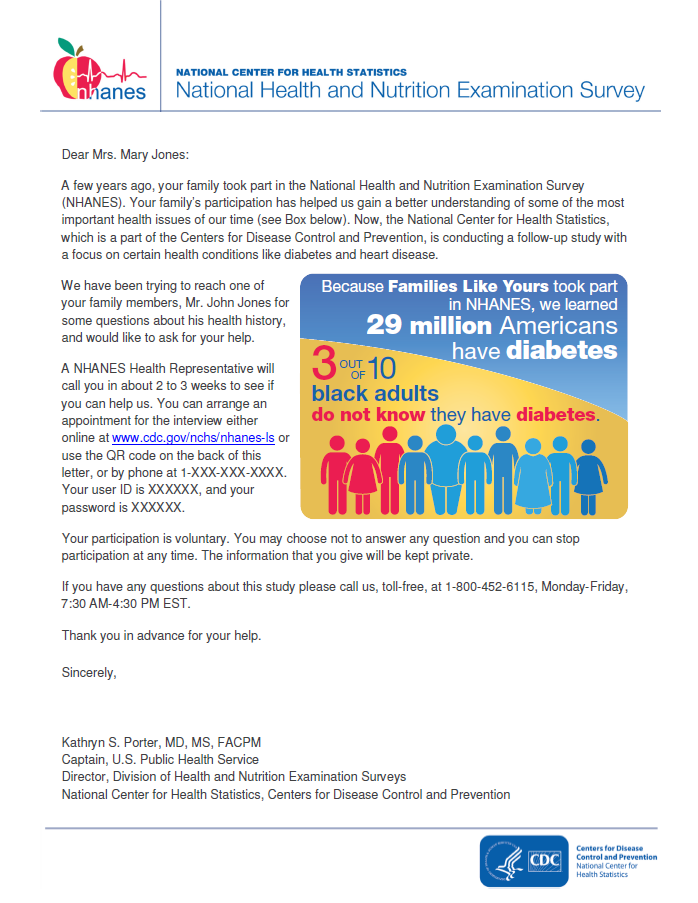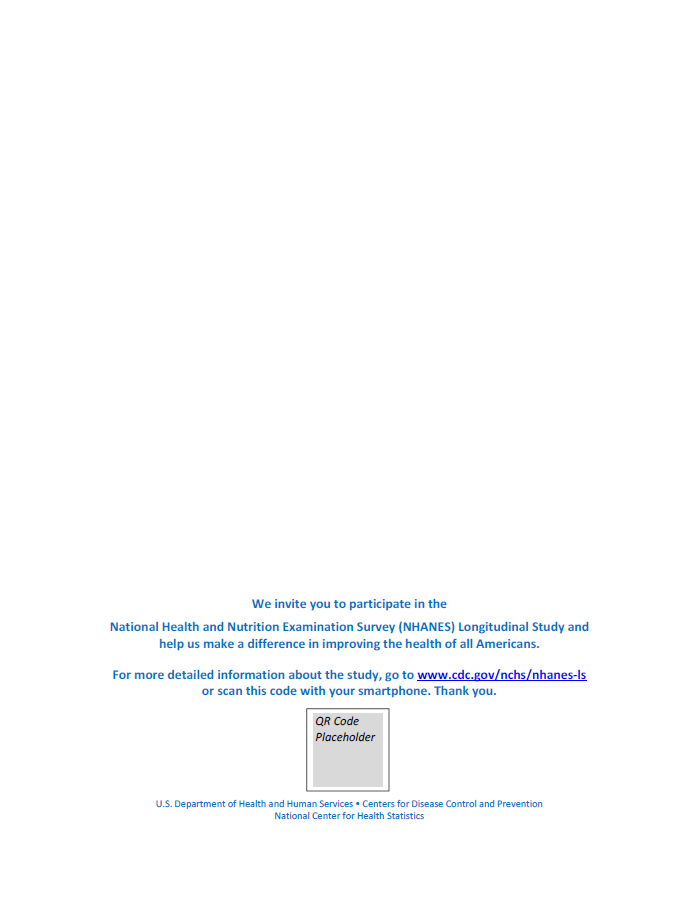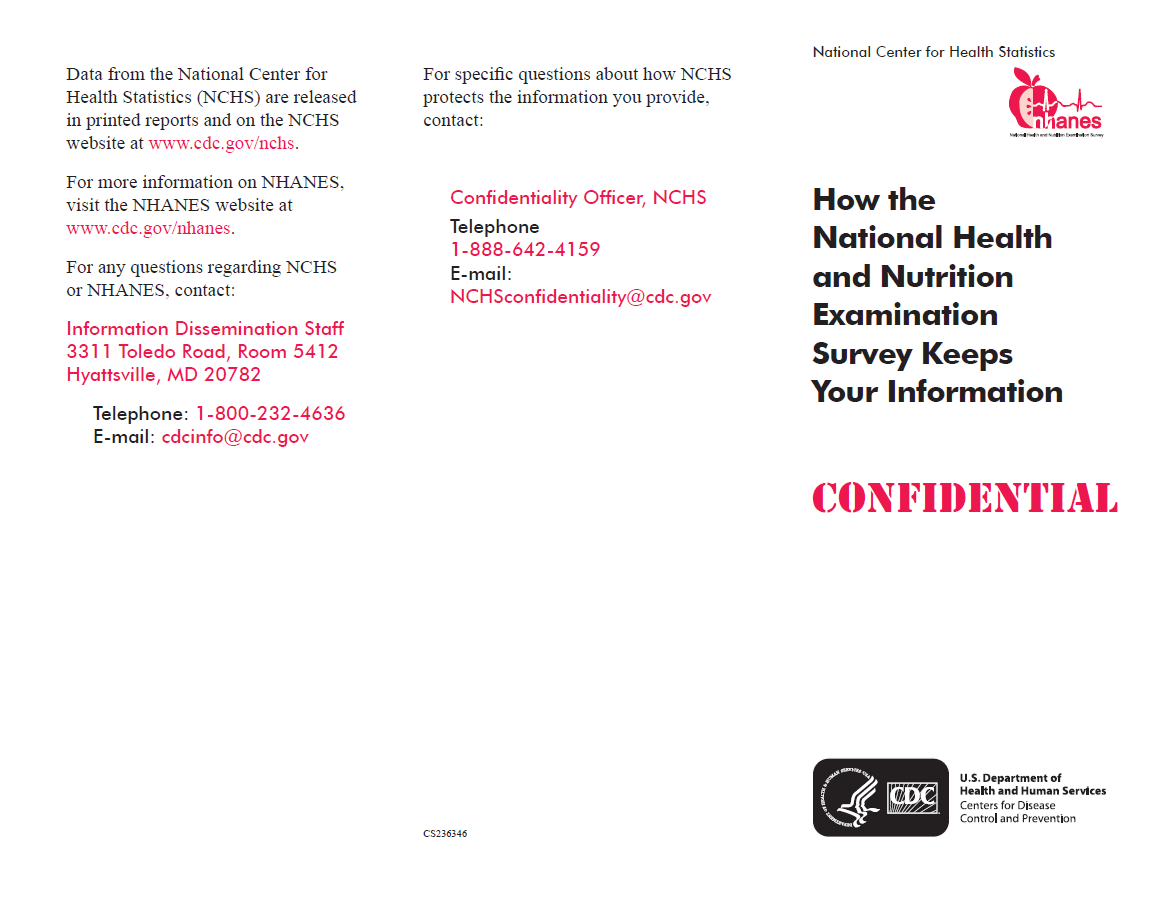Advance Materials for Contacting the Proxy of a Deceased Participant
Att 4b_Decedent Proxy Mails_170209.docx
The NHANES Longitudinal Study – Feasibility Component
Advance Materials for Contacting the Proxy of a Deceased Participant
OMB: 0920-1176
Attachment 4b
Advance Materials for Contacting
the Proxy of Deceased Participant
Appendix 4b-1. Proxy rules for deceased participants
Appendix 4b-2. The advance letter for contacting a proxy who
responded to the original family or screener questionnaire
Appendix 4b-3. The advance letter for contacting a proxy who was
identified as a future contact at the baseline
Appendix 4b-4. Example of the advance letter with letterhead
Appendix 4b-5. The reminder letter
Appendix 4b-6. The NHANES Confidentiality Brochure
Attachment 4b. Advance Materials for Contacting the Proxy of Deceased Participant
For participants deceased prior to the re-contact, a proxy will be identified and contacted for an interview via telephone. Procedures used to identify the proxy for a deceased participant have been reviewed by the Office of the General Counsel at CDC for confidentiality protection and CIPSEA compliance and are described in Appendix 4b-1.
The advance materials are designed to provide some background information to the identified proxy and to encourage their participation. There are two advance mailings for contacting the deceased participant proxy:
The advance letter
Send to the proxy’s last known address 21 days prior to the start of phone interview to make the initial contact
Use Priority Mail with the “Address Service Requested” option
Content:
A personalized letter
There are two versions of the letter:
To contact proxies identified because of their role as the respondent for the family or screener questionnaire at baseline (Appendix 4b-2),
To contact proxies identified by participants as future contacts during the original survey (Appendix 4b-3).
An infographic will be embedded in the letter to highlight race-ethnicity specific diabetes results from NHANES based on the participant’s race and Hispanic origin. See Appendix 4b-4 for an example.
The NHANES magnet
The NHANES Confidentiality Brochure (Appendix 4b-6)
The reminder letter (Appendix 4b-5)
Send to the participant 14 days later, if the advance letter was delivered successfully, but no response was received from the participant
Use First Class Mail
All letters will be available in English and Spanish. Asian language assistance will be available via telephone. During the original NHANES interview, several participants requested that material be mailed to them in specific Asian languages. For these participants’ proxies, a note in the specified language will be included in the letters to provide a toll-free number for them to call and receive assistance. Please see Appendix 4a-5 for an example note in traditional Chinese.
Appendix 4b-1. Proxy Rules for Deceased Participants
For participants believed to be deceased prior to the re-contact, a proxy will be identified for a telephone interview to help confirm the death and to provide information on the decedent’s medical history and health status prior to the death. A family member or a close acquaintance, such as the spouse or the informant listed on the death certificate, would be the ideal proxy for the purpose of the follow-up study because they are likely the persons most familiar with the decedent’s health history prior to the death. However, such family members or friends may or may not be aware of the decedent’s prior participation of NHANES. Section 308(d) of the Public Health Service Act and the Confidential Information Protection and Statistical Efficiency Act (CIPSEA) require us to adhere to confidentiality standards which prevents us from disclosing the participation of NHANES without the person’s permission, even after their death. To achieve the balance between identifying the proxy with the most knowledge of the participant while being in accordance with the confidentiality requirements, we propose to select the proxy for decedents from the following three sources:
Source of Potential Proxy |
Rationale of Confidentiality Compliance |
|
As part of original NHANES data collection, a Family Questionnaire was administered in the home to obtain family-level information. An adult family member who is knowledgeable about family matters, usually the head of the family or the spouse of the family head, was asked to be the respondent for the Family Questionnaire. Re-contacting the Family Questionnaire respondent does not post a disclosure concern about the family’s participation in the survey. |
B. Original Screener Questionnaire respondent |
As part of original NHANES data collection, a Screener Questionnaire was administered at the doorstep when the survey interviewer first approached the household. The respondent to the Screener Questionnaire is the adult family member who willingly enumerated the entire household members at the baseline including providing names, genders, and dates of birth for each family member. Re-contacting this person would not be a disclosure concern about the family’s participation in the survey. |
C. Two persons identified in the baseline for future contact |
During the original NHANES data collection, we asked respondents to provide the names, addresses, and telephone numbers of two relatives or friends who did not live in the same household and who can help us to reach them in case we have trouble contacting the respondents in the future. For the longitudinal study, we plan to reach out to these two contact persons and ask them to serve as proxy. Since the participants provided the names for the purpose of locating themselves, they gave consent for NCHS to contact those persons and reveal the fact of their participation to the survey. |
Only one proxy interview will be conducted for each deceased participant. Potential proxies will be contacted based on the priority list below. If the re-contact of the potential proxy with highest priority is not successful (for example, lost follow-up, mentally or physically incapable of participation, or reluctant to respond), contact attempts will be made to the person with next highest priority, until the list of potential proxies is exhausted.
Contact Priority for Potential Proxies |
|
|
|
|
|
|
These proposed proxy rules for deceased participants have been reviewed by the Office of the General Counsel (OGC) for confidentiality protection and CIPSEA compliance.
Appendix 4b-2. The Advance Letter for Contacting a Proxy Who Responded to the Original Family or Screener Questionnaire
Reading Level: 10.0
--------------------------------------------------------------------------------------------------------------------------------
Dear [Proxy Name]:
A few years ago, your family took part in the National Health and Nutrition Examination Survey (NHANES). Your family’s participation has helped us gain a better understanding of some of the most important health issues of our time (see Box below). Now, the National Center for Health Statistics, which is a part of the Centers for Disease Control and Prevention, is conducting a follow-up study with a focus on certain health conditions like diabetes and heart disease.
We have been trying to reach one of your family members, {SP’S PREFIX} {SP NAME} for some questions about {his/her} health history, and would like to ask for your help.
A NHANES Health Representative will call you in about 2 to 3 weeks to see if you can help us. You can arrange an appointment for the interview either online at www.cdc.gov/nchs/nhanes-ls or use the QR code on the back of this letter, or by phone at 1-XXX-XXX-XXXX. Your user ID is XXXXXX, and your password is XXXXXX.
Your participation is voluntary. You may choose not to answer any question and you can stop participation at any time. The information that you give will be kept private.
If you have any questions about this study please call us, toll-free, at 1-800-452-6115, Monday-Friday, 7:30 AM-4:30 PM EST.
Thank you in advance for your help.
Sincerely,
Kathryn
S. Porter, MD, MS, FACPM
Captain, U.S. Public Health Service
Director, Division of Health and Nutrition Examination Surveys
National Center for Health Statistics, Centers for Disease
Control and Prevention
Appendix 4b-3. The Advance Letter for Contacting a Proxy Who Was Identified as a Future Contact at the Baseline
Reading Level: 8.8
--------------------------------------------------------------------------------------------------------------------------------
Dear [Proxy’s Name]:
A few years ago, {SP’S PREFIX} {SP NAME} took part in the National Health and Nutrition Examination Survey (NHANES). NHANES is a health survey run by the National Center for Health Statistics (NCHS), which is a part of the Centers for Disease Control and Prevention. {His/Her} participation helped us learn about some of the most important health issues of our time (see Box below). Now, NCHS is conducting a follow-up study with a focus on certain health conditions like diabetes and heart disease.
When {SP’S PREFIX} {SP’S LAST NAME} participated in our survey, {He/She} told us we could contact {him/her} for future studies. Your information was also provided to help us locate {him/her} if we couldn’t reach {him/her} in the future. {He/She} said you would be someone who knows where to find {him/her}. We have been trying to reach {him/her} recently for some questions about {his/her} health history, and would like to ask for your help.
A NHANES Health Representative will call you in about 2 to 3 weeks to see if you can help us. You can arrange an appointment for the interview either online at www.cdc.gov/nchs/nhanes-ls or use the QR code on the back of this letter, or by phone at 1-XXX-XXX-XXXX. Your user ID is XXXXXX, and your password is XXXXXX.
Your participation is voluntary. You may choose not to answer any question and you can stop participation at any time. The information that you give will be kept private.
If you have any questions about this study please call us, toll-free, at 1-800-452-6115, Monday-Friday, 7:30 AM-4:30 PM EST.
Thank you in advance for your help.
Sincerely,
Kathryn
S. Porter, MD, MS, FACPM
Captain, U.S. Public Health Service
Director, Division of Health and Nutrition Examination Surveys
National Center for Health Statistics, Centers for Disease
Control and Prevention
Appendix 4b-4. Example of the Advance Letter with Letterhead


Appendix 4b-5. The Reminder Letter
Reading Level: 9.6
--------------------------------------------------------------------------------------------------------------------------------
Dear [Proxy Name]:
Recently, we sent you a letter asking you to help us with some questions we have about {SP’S PREFIX} {SP NAME’s} health history as part of the National Health and Nutrition Examination Survey (NHANES). The study will focus on certain diseases like diabetes and heart disease.
If you would like to help us, you can arrange an appointment online or by phone. Please visit us at www.cdc.gov/nchs/nhanes-ls or use the QR code on the back of this letter, or call us at 1-XXX-XXX-XXXX. Your user ID is XXXXXX, and your password is XXXXXX.
If you have any questions about this study please call us, toll-free, at 1-800-452-6115, Monday-Friday, 7:30 AM-4:30 PM EST.
Thank you in advance for your help.
Sincerely,
Kathryn
S. Porter, MD, MS, FACPM
Captain, U.S. Public Health Service
Director, Division of Health and Nutrition Examination Surveys
National Center for Health Statistics, Centers for Disease
Control and Prevention
Appendix 4b-6. The NHANES Confidentiality Brochure
The Confidentiality Brochure below is adopted from the current NHANES. The language is consistent with the text used in the consent brochure (Attachment 5) for living participants.
![]()
|
||
NCHS and NHANES Our promise The National Center for Health Statistics (NCHS) carried out the first National Health and Nutrition Examination Survey (NHANES) in 1960. Today, more than 50 years later, the promise to protect the privacy of everyone remains our top priority. We believe this record is an important reason why so many people are willing to take part in the survey.
There’s safety in numbers, especially our numbers!
The law… We take your privacy very seriously. The information you give us will be used for statistical research only. This means that your information will be combined with other people’s information in a way that protects everyone’s identity. As required by federal law, only those NCHS employees, our contractors, and our specially designated agents who must use your personal information for a specific reason can see it. Otherwise, your data will only be shared after all information that could identify you and/or your family has been removed. Strict laws prevent us from releasing information that could identify you or your family to anyone else without your consent. |
A number of federal laws require that all information we collect be kept confidential: Section 308(d) of the Public Health Service Act (42 United States Code 242m(d)), the Confidential Information Protection and Statistical Efficiency Act (CIPSEA, Title 5 of Public Law 107-347), and the Privacy Act of 1974, 5 U.S.C. § 552a. Every NCHS employee, contractor, research partner, and agent has taken an oath to keep your information private. If he or she willfully discloses ANY identifiable information, he/she could get a jail term of up to five years, a fine of up to $250,000, or both. In addition, NCHS complies with the Federal Cybersecurity Enhancement Act of 2015. This law requires the federal government to protect federal computer networks by using computer security programs to identify cybersecurity risks like hacking, internet attacks, and other security weaknesses. The Act allows software programs to scan information that is sent, stored on, or processed through government networks in order to protect the networks. If any cybersecurity risk is detected, the information system may be reviewed for specific threats by computer network experts working for the government (or contractors or agents who have governmental authority to do so). Only information directly related to government network security is monitored. The Act requires any personal information that identifies you or your family to be removed from suspicious files before they are shared. |
The pledge… Anyone working on NHANES must sign a pledge. This makes them subject to punishment by Federal laws, including the Privacy Act, the Public Health Service Act, and others.
The penalties… People who break these laws can be fined up to $250,000, lose their job, or go to jail.
Other ways we protect your privacy Those working for NCHS must also follow special rules for handling private information. These rules are meant to ensure that the privacy of the people taking part in NHANES is fully respected.
NCHS and NHANES will not release your private data without your consent! |
Data from the National Center for Health Statistics (NCHS) are released in printed reports and on the NCHS website at www.cdc.gov/nchs.
For more information on NHANES, visit the NHANES website at www.cdc.gov/nhanes.
For any questions regarding NCHS or NHANES, contact:
National Center for Health Statistics Information Dissemination Staff 3311 Toledo Road, MS P08 Hyattsville, MD 20782
Telephone: 1-800-CDC-INFO (1-800-232-4636) TTY: 1-888-232-6348 Online request form: www.cdc.gov/info Internet: www.cdc.gov/nchs
|
For specific questions about how NCHS protects the information you provide, contact:
Confidentiality Officer, NCHS Telephone: 1-888-642-4159 E-mail:
|
|
| File Type | application/vnd.openxmlformats-officedocument.wordprocessingml.document |
| File Title | CDC INSTITUTIONAL REVIEW BOARD (IRB) |
| Author | vlt0 |
| File Modified | 0000-00-00 |
| File Created | 2021-01-22 |
© 2026 OMB.report | Privacy Policy


